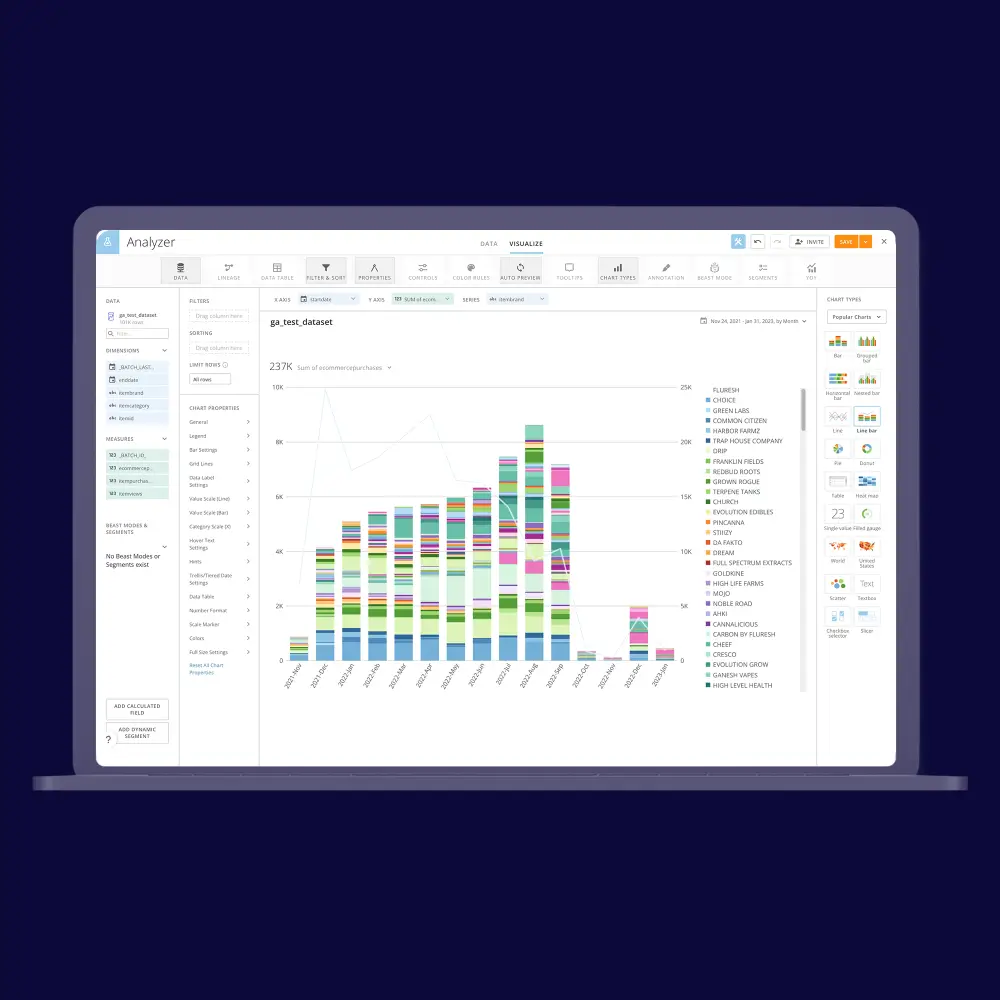
Home page / Real Estate Data
Real Estate Data: Complex Numbers for Simple Property Choices
Custom development in real estate integrates property listings, pricing engines, client management, and transaction workflows. Real estate data management keeps the modules clean and connected, while AI in real estate adds forecasting, risk scoring, and demand analysis. The result is fewer blind spots in decision-making, faster deal cycles, and tighter control over portfolio value.

Practical AI and Data Engineering Solutions for Real Estate
Real estate runs on manual processes that break at scale. These real estate data services handle the specific bottlenecks without creating new problems.
Property Valuation & Market Analysis
Manual valuations consume time and yield inconsistent results that can cost deals. AI models, predictive analytics, real estate approaches, and machine learning algorithms analyze property data, market patterns, and comparable sales to generate valuations in minutes.
Customer Segmentation & Personalized Marketing
Generic marketing campaigns waste budget on people who won't make a purchase. Market segmentation analysis, powered by real estate data analytics and customer journey mapping, identifies buyer types and creates targeted campaigns that convert better than spray-and-pray approaches.
AI-Powered Lead Qualification & Nurturing
Most leads require manual screening, which delays response times and misses hot prospects. AI for real estate agents scores leads by intent and budget, then automated assistants handle initial contact to reduce manual screening by 60-80% and cut response time to under 2 minutes.
Automated Document Processing & Compliance
Document preparation and compliance checks consume 50-70% of admin time before closings. AI in the real estate industry extracts data from contracts and reports, flags missing signatures and risks, and speeds up closures by days.
Multi-Channel Communication Hub
Scattered communication across email, text, and chat can result in dropped leads and delayed responses. One unified inbox routes all messages intelligently and ensures a 24/7 response without hiring more staff.
Real Estate Workflow Optimization Dashboard
Deal pipelines and task management often reside in separate systems, creating blind spots and delays. Centralized business intelligence dashboards with portfolio performance analytics track everything in one place and flag bottlenecks to reduce operational delays by up to 35%.
Client Property Portal with Data Hub Integration
Clients frequently request updates because information is stored in disconnected systems. Secure portals give clients direct access to contracts, property data, and transaction status. Central real estate data aggregation hubs sync information across platforms to reduce client calls by 50%.
Real-Life Examples of AI for Real Estate Data Usage
Benefits Of AI For Real Estate
Sometimes real estate tech sounds impressive until you try to implement it. Here's what these tools really do when the sales pitch ends.
01
Accelerated Deal Velocity and Higher Closure Rates
With data analysis for real estate and lead scoring & property valuation models, real estate professionals can identify serious buyers faster and price properties optimally—leading to 25-40% faster deal closure and higher conversion rates.
02
Enhanced Investment Decision-Making
With market trend forecasting and property investment intelligence, investors identify profitable opportunities earlier, boosting real estate ROI optimization by 20-30%.
04
Improved Customer Engagement and Retention
With AI-generated personalized marketing, dynamic segmentation, and buyer journey insights, real estate companies can deliver relevant experiences across all touchpoints. AI-driven real estate data services enable personalized experiences, increasing engagement by 35%.
05
Faster and More Accurate Market Intelligence
By leveraging data integration platforms, real estate teams can respond to market changes quickly and make more informed decisions regarding pricing and investment.
.svg)
Get market alerts 2-3 weeks before brokers notice trends.
Schedule a call.
Technologies for The Real Estate Data Analysis

Pandas

SciPy

TensorFlow

Numpy

ADTK

DBscan

G. AutoML

Keras

MLFlow

Natural L. AI

NLTK

OpenCV

Pillow

PyOD

PyTorch

FB Prophet

SageMaker

Scikit-learn

SpaCy

XGBoost

YOLO
FAQ Asked to Real Estate Data Providers
Can your analytics help us identify high-potential investment opportunities?
Only if your real estate data is clean. Our real estate data analyst team uses data analysis for real estate to detect pricing patterns and demographic shifts. While market crashes and policy changes can still disrupt, investment risk assessment built into our models helps mitigate exposure.
Can you integrate data from our CRM, MLS, property management systems, and marketing platforms?
Yes, but expect 2-4 weeks of real estate data entry services and cleaning before integration works properly. Integration works when systems have proper APIs and consistent data formats. Legacy systems and inconsistent data formats add complexity, but once connected, your team gains a single source of truth powered by real estate CRM analytics.
What types of dashboards and reports do you provide for real estate operations?
Our real estate data analytics dashboards track lead conversion, property performance, maintenance costs, and ROI. Reports show lead conversion rates, property valuations, maintenance costs, and revenue projections. Dashboards update in real-time, but incorrect data sometimes still yields inaccurate insights.
What level of customization is available for real estate dashboards and reports?
Full customization for metrics, layouts, user permissions, and data sources. You can track any KPI that matters to your business model. Complex customizations take longer and cost more than standard templates.
Can your analytics predict maintenance needs and operational costs for our properties?
Through data science for real estate using historical maintenance data, property age, and usage patterns. Predictions are most accurate when based on two or more years of detailed maintenance records. Emergency repairs and natural disasters still happen without warning.
Do you provide real-time market alerts and automated reporting for investment opportunities?
Our AI-powered platforms in the real estate industry deliver alerts when opportunities arise. Automated reports deliver weekly summaries of opportunities, pricing changes, and portfolio performance. Alert fatigue happens when thresholds are set too broadly.
How quickly can you implement a property valuation system for our portfolio?
Basic real estate data analysis models typically take 4-6 weeks to complete, provided clean datasets are used. Complex real estate data aggregation requires longer. Data quality issues and custom requirements extend implementation time.
Let’s discuss your project
Share project details, like scope or challenges. We'll review and follow up with next steps.



.svg)































